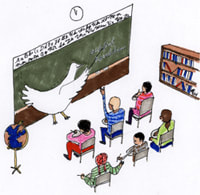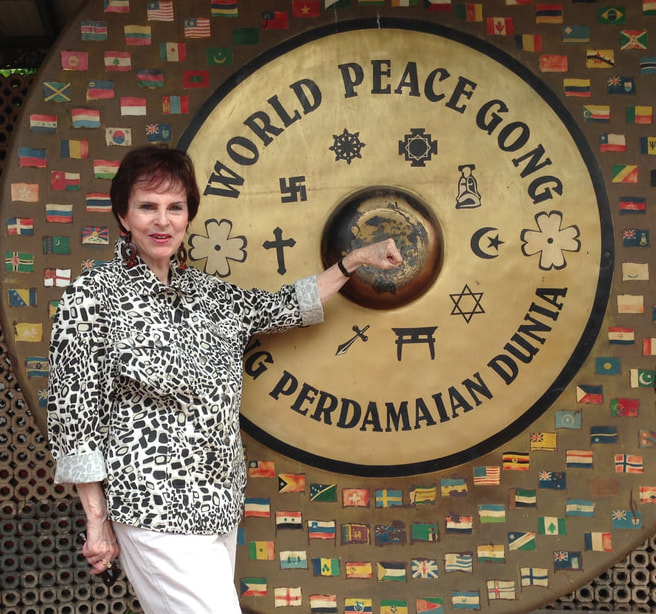- Home
-
Overview
- Study Guide
- The Single Most Important Idea
- Mission Statement
- War Is Not Inevitable keynote speech
- Capstone Essay: "To Abolish War"
- An Action Plan
- The Nine Cornerstones
- How Far We Have Already Come
- The Secret Ingredient
- The Vision Thing
- How Long It Will Take
- What You Can Do
- The AFWW Logo Explained
- Examples of War Expenses
- Biological Differences
- What Makes People Happy
- Map of Non-warring Cultures
- Cornerstones
- Videos
- Books
- Blog
- Project Enduring Peace
- About
- Related Projects
- Contact
|
Man-the Warrior or Humans-the-Cooperators - by Judith Hand The “man-the-warrior” hypothesis, the one science has embraced for quite some time, tilts us heavily toward pessimism. It’s not a particularly happy image. But the times, they are a’changin.’ This view of humanity’s deep past is being seriously questioned by recent data and reanalysis of old data. That’s one of the great beauties of science: the ability to reassess.
For decades the view of human ancestry, and of the origins of war, have been shaped by reference to what was thought to be our closest relative, the common chimpanzee (Pan troglodytes). The general thinking was that our common ancestor way back when must have had behavior and drives much like what we would see in common chimpanzees, and so we had much to learn by observing our close kin in the wild. Even before someone saw the first case of a gang of male chimpanzees sneaking up on another chimpanzee from a different group to kill it, many students of human evolution had bought into what has been called the “man-the-warrior” model of human evolution. Read more here.
0 Comments
Recently, in an exchange with talk show host Barry F. Seidman (Equal Time for Freethought; WBAI-NY), who describes himself as a secular humanist, the subject of paradigm shift came up. The host is an advocate of libertarian-socialism (anarchism), a good man who envisions a future for our species much like that envisioned by AFWW: egalitarian, just, less violent, ecologically sustainable, and free of war. He sees us trapped in endless cycles of war, polluting and denuding our environment at a perilous rate, and challenged by the juggernaut of global warming. In other words, like most well-read and broadly-informed people, he sees the mess we've gotten ourselves into. When questioned by me about whether or not he used his voice, via his radio program and interviews with experts, to encourage the global empowerment of women as rapidly as possible in order to achieve his vision, his response was, No. "Unless we change the current capitalist system, adding more women to government won't make any difference." Ah, I thought, this very enlightened man of good will, like most men, women, well-meaning organizations, and governments, has it the wrong way 'round. Let me explain. Maybe you agree with him. Maybe you also feel that to fix what's wrong with us, other issues command first priority. You may agree with him that the crucial focus is to change "the system," and then there will be time to get more women involved.  Or perhaps you feel the place to start is by teaching people, young and old, one person at a time, how to resolve their conflicts nonviolently, how to live in peace as a daily practice. When we do that, the assumption seems to be, men everywhere, even those in the Muslim world, will then peacefully accept women as equals and will embrace women as full partners, in our homes, governments, and in global decision-making.  Or maybe you feel that paradigm shift necessitates tackling the war industry head-on, ending the use of land mines, cluster bombs, and nuclear weapons—and working forward from there. Or maybe your focus is on ending poverty. Or spreading the enlightenment and freedom that comes with liberal democracy. In other words, you too may think that empowering women is a good thing, but something that can wait until after we fix the really important problem/s, after we fix the really big barriers to positive change in human history. |
Follow Me on Facebook
If you'd like to read my take on current affairs, or get a sense of what amuses me or I find educational or beautiful, do a search and follow me, Judith Hand, on Facebook. About the AuthorDr. Judith L. Hand. Dr. Hand earned her Ph.D. in biology from UCLA. Her studies included animal behavior and primatology. After completing a Smithsonian Post-doctoral Fellowship at the National Zoo in Washington, D.C., she returned to UCLA as a research associate and lecturer. Her undergraduate major was in cultural anthropology. She worked as a technician in neurophysiology laboratories at UCLA and the Max Planck Institute, in Munich, Germany. As a student of animal communication, she is the author of several books and scientific papers on the subject of social conflict resolution.
Categories
All
Archives
November 2019
|
A Future Without War
Believe in it. Envision it. Work for it.
And we will achieve it.
Believe in it. Envision it. Work for it.
And we will achieve it.
AFWW is continually developed and maintained by Writer and Evolutionary Biologist Dr. Judith Hand.
Earth image courtesy of the Image Science & Analysis Laboratory, NASA Johnson Space Center. Photo Number AS17-148-22727 eol.jsc.nasa.gov
©2005-2019 A Future Without War. All rights reserved. Login
Earth image courtesy of the Image Science & Analysis Laboratory, NASA Johnson Space Center. Photo Number AS17-148-22727 eol.jsc.nasa.gov
©2005-2019 A Future Without War. All rights reserved. Login
- Home
-
Overview
- Study Guide
- The Single Most Important Idea
- Mission Statement
- War Is Not Inevitable keynote speech
- Capstone Essay: "To Abolish War"
- An Action Plan
- The Nine Cornerstones
- How Far We Have Already Come
- The Secret Ingredient
- The Vision Thing
- How Long It Will Take
- What You Can Do
- The AFWW Logo Explained
- Examples of War Expenses
- Biological Differences
- What Makes People Happy
- Map of Non-warring Cultures
- Cornerstones
- Videos
- Books
- Blog
- Project Enduring Peace
- About
- Related Projects
- Contact




 RSS Feed
RSS Feed